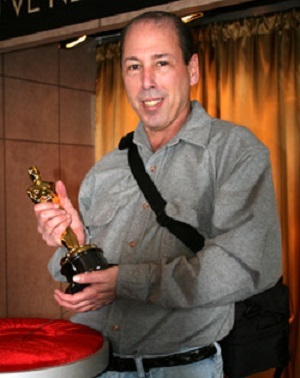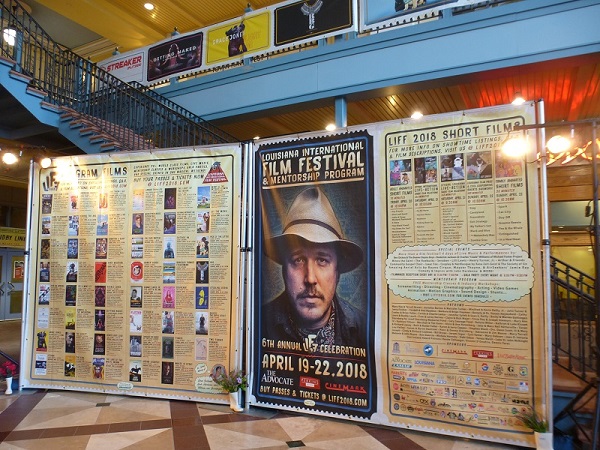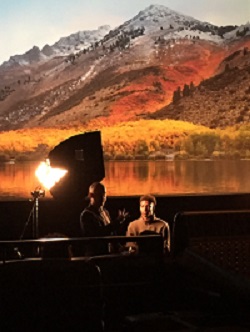Editor's Note: It's been a busy few weeks for the Big Picture Big Sound staff as we've found ourselves covering a couple of film festivals. You've probably seen David Kempler and Matt Passantino's reviews from the Tribeca Film Festival (April 18-29) in NYC, where they caught up on a wide range of offerings including documentaries, dramas, and comedies. And I had the opportunity to attend the burgeoning Louisiana International Film Festival (April 19-22) in Baton Rouge, which proved to be a busy and exciting four-day mix of full-length narrative and documentary offerings, creative short subject entries, filmmaker panels, instructive lectures, and parties, parties, parties!
Film festivals aren't for the faint of heart. You need to be ready - eager, in fact - to watch multiple films back to back and also have the energy to check out related special events and engage in lots of conversations with fellow movie lovers and those in the industry. Each festival is different, but for anyone who's thinking about checking out a fest, or if you're just curious about what goes on after you grab that festival pass, here are some of our thoughts on Tribeca and LIFF.
-Lora
David Kempler on the Tribeca Film Festival
For about a decade I have been attending the Tribeca Film Festival, and it's the highlight of my movie-going year. It takes place for two weeks every April with public screenings held at several theaters in the Tribeca neighborhood in Lower Manhattan. As a critic, I have access to the films during those screenings, and also for four weeks beforehand. In those four weeks I have the option to view about 25 films a week, including up to five on each Saturday and Sunday. I usually opt to see all 10 over each weekend and maybe another 10 during the week.
What does David recommend from this year's Tribeca lineup? Check out Satan & Adam, White Tide, To Dust
Yeah, it can be a grind, but I particularly love those weekends when I'm buried in film, even if some of those movies should never be allowed to make it to the screen. Thankfully, as the years go by, the quality of Tribeca's entries has consistently continued to rise. Today, there are far more worthwhile ones than clunkers.

When you see five films in a row, obviously it's a long day. The schedule usually kicks off at 10am and ends around 6pm. The breaks between them range from 10-20 minutes, leaving you just enough time to hit the bathroom and run outside to grab and inhale a cup of coffee when needed. At the pre-festival screenings it's strictly forbidden to eat or drink, or you risk facing the wrath of the projectionist, who can ban you forever. (At least that's what I've been led to believe. It's been the same guy for as long as I can remember, and while I've never seen him smile, he's nice enough.)
On a typical TFF weekend I drive into Manhattan early because it's fairly easy to park in the part of Tribeca where the festival is held. After a quick breakfast at a mediocre nearby eatery I'm off to the screening room entrance, where I'm usually the first or second to arrive because I always want to sit in the last row, the only one with comfortable leather chairs. If I'm going to sit through eight hours of screenings, I want to be comfortable.
As soon as schedule books are available for the public portion of the festival I begin the task of figuring out how to tackle that. Each film screens one to three times for critics at the festival, and depending on how many I have seen at pre-screenings it can become a scheduling nightmare. Some will inevitably be missed, so it's up to me to decide what to pass on.
I also get invited to evening screenings and parties, but as the years go by these have become less attractive to me. Some parties can be fun; others can be total duds. This year I didn't attend any. Maybe next year I'll go to all of them. Who knows?
I get invited to lots of film festivals, but so far I haven't attended any other than Tribeca. It would be great to go to Cannes or Sundance, but that can be pricey. Big Picture Big Sound hasn't yet offered to pay for my flight to France, first class accommodations, and bottomless expense account, so it's unlikely I will be rubbing elbows with the beautiful people in the near future. But that's ok - I love it just the way it is.
Lora Grady on the Louisiana International Film Festival
You wouldn't think it's possible for a film critic to move to Louisiana without realizing just how vital and vibrant the film industry is in the Pelican State. But this year I managed to do just that, so spending time at the fifth annual Louisiana International Film Festival in capital city Baton Rouge ended up being quite a learning experience.

LIFF is really a celebration of the state's homegrown film industry. Many of this year's entries were shot in Louisiana and featured local actors, writers, producers, and directors. Among the features, musical biopic "Blaze," crime thriller "Dark Meridian," and ticking-clock thriller "Dead on Arrival" all boasted plenty of local production time. On the documentary side, "1000 Year Flood," exploring the devastating 2016 floods in and around Baton Rouge, hit hard for local viewers, while "Larger than Life: the Kevyn Aucoin Story" balanced things out with the inspiring story of the internationally renowned makeup artist who hailed from nearby Lafayette. In addition to these festival features, there was talk throughout the weekend about the Tom Hanks WWII feature "Greyhound" shooting in Baton Rouge.
For more on New Orleans-based thriller "Dark Meridian" and the current state of Hollywood South, check out my interview with actor Billy Slaughter and director Rankin Hickman.
But LIFF isn't just about showcasing the products of the region's film industry. It also serves as a gateway for aspiring filmmakers who want a foot in the door, or as a resource for anyone who just wants to learn more about what goes into making a movie. LIFF's Mentorship program, which is open to all, not just festival passholders, featured a lineup of participating filmmakers and industry members presenting panels and workshops throughout the weekend. Lucky participants received a crash-course on a variety of topics, including indie movie-making, screenwriting, casting, visual effects, camera operating, sound mixing, film financing, and entertainment law. Many presentations took place at Celtic Studios, which I learned is a full-service production facility that wouldn't be out of place alongside the sprawling Warner Bros studios in sunny Burbank, CA.

Once inside the gates at Celtic I had the chance to attend a lighting workshop and Q&A with Teddy Smith, who has nearly 20 years of experience as a DP/cinematographer and camera operator, as well as having directed festival entry "Urban Country." In addition to demonstrating different lighting setups such as key, high, side, and multisource, Mr. Smith also answered audience questions about his career path and industry breaks, including working on a project in another capacity when the director dropped out and "I stepped up as the director and finished on time and on budget, and once I proved I could do it, that led to other projects. Sometimes you have to just stand up and say ‘that's what I want to do.'" Sound advice for anyone who wants to follow their dreams into the film industry.
Many who've already followed their dreams into the industry had the chance to see their films screened over the four days of the Louisiana International Film Festival. The fest was hosted by Baton Rouge's Perkins Rowe, where Cinemark theaters provided the screens and an open retail space was transformed into the Filmmakers Lounge for patrons and industry members to hang out and discuss the entries. LIFF uses audience voting to determine their awards, so on Sunday night everyone felt a sense of ownership when the winners were announced: Best Louisiana Feature, "Blaze;" Best Narrative Feature, "Streaker;" Best Louisiana Documentary, "Larger Than Life: The Kevyn Aucoin Story;" and Best Documentary, "Sammy Davis, Jr: I've Gotta Be Me." My personal favorites included biopic "Blaze," tangled crime yarn "American Animals," and the stellar marathon documentary "Boston" (of course!).
LIFF is an impressive festival that draws high-quality entries and is a pleasure to attend. The thoughtful programming of films and events ensures that there isn't too much overlap - screenings were even being added throughout the weekend in response to audience interest - and it's easy to navigate due to the self-contained and pedestrian-friendly location. I'd recommend it to anyone who wants to check out the best of what Hollywood South has to offer.
| Movie title | Tribeca Film Festival & Louisiana International Film Festival |
|---|---|
| Release year | 2018 |
| MPAA Rating | |
| Our rating | |
| Summary | BPBS gives you the scoop on the Tribeca Film Festival and the Louisiana International Film Festival. |